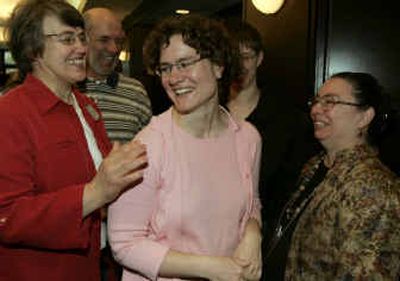Lesbian minister wins appeal

WASHINGTON – A Methodist minister who was defrocked because she admitted to living in a lesbian relationship won her appeal Friday and was reinstated by a church court on narrow procedural grounds.
A regional appeals panel of five United Methodist Church ministers and four laypeople concluded that a lower church court committed legal errors last December when it convicted the Rev. Irene Elizabeth “Beth” Stroud of violating the church’s ban on “self-avowed practicing homosexuals” in the clergy.
For Stroud, 35, the decision was a victory that could prove temporary. In theory, she could immediately put on her clerical vestments and resume her duties as an associate pastor at the First United Methodist Church of Germantown, a liberal parish in Philadelphia. But she said she would not do so, because she expects her bishop to appeal the case to the church’s highest court, the Judicial Council, and will wait for its decision.
“To me, ordination is something very sacred and very holy, and to take it up, knowing that I might need to lay it down again, would feel like trivializing,” she said. “It was hard to take the robe off and stop celebrating communion once. Before I take it up again, I want to know that the United Methodist Church is really ready to affirm my ministry.”
For the nation’s second largest Protestant denomination, with 8.3 million members in the United States, the decision guarantees more arguments over the possible contradictions between its nondiscrimination policy and its stand on homosexuality.
Like many mainline denominations, the United Methodist Church has been wrestling for years over the ordination of gay clergy members. The Stroud case is just the latest test of its “don’t ask, don’t tell” policy, which has proved difficult to enforce.
In March 2004, a jury of Methodist ministers near Seattle acquitted the Rev. Karen Dammann, even though she had declared in a letter to her bishop that she was living in a same-sex relationship and did not deny it at her trial.
In response to that ruling, delegates to the church’s quadrennial General Conference, its highest legislative assembly, voted in Pittsburgh last May to reaffirm a passage in the Methodist Book of Discipline that says “the practice of homosexuality is incompatible with Christian teachings.” At the same time, the Judicial Council ruled that Methodist ministers who are found in a church trial to be “self-avowed practicing homosexuals” cannot hold any appointment in the church.
Stroud was the first minister to go on trial for homosexuality since the church tightened its rules. She has publicly acknowledged on numerous occasions, including an April 27, 2003, sermon to her congregation, that she is living in a “committed, covenanted” relationship with another woman.
Last December, a jury of 13 fellow ministers voted to convict her of “engaging in practices declared by the United Methodist Church to be incompatible with Christian teachings” and removed her credentials as a minister. She stayed on at the Philadelphia parish as a lay employee.
In Friday’s 8-1 ruling, the church’s Committee of Appeals for the Northeast Jurisdiction did not question the lower court’s findings of fact. But after deliberating for a day, it said the decision had violated Stroud’s right to due process because the church has never clearly defined the terms “practicing homosexual” or “status.”